
Grand Duke Alexei Petrovich of Russia was a Russian Tsarevich. He was born in Moscow, the son of Tsar Peter I and his first wife, Eudoxia Lopukhina. Alexei despised his father and repeatedly thwarted Peter's plans to raise him as successor to the throne, to continue his policies. His brief defection to Austria scandalized the Russian government, leading to harsh reprisals against Alexei and his associates. Alexei died after interrogation under torture, and his younger half brother Peter Petrovich became the new heir apparent.
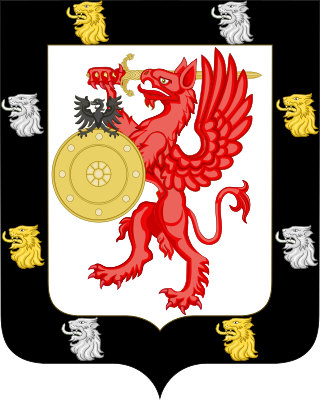
The House of Romanov was the reigning imperial house of Russia from 1613 to 1917. They achieved prominence after Anastasia Romanovna married Ivan the Terrible, the first crowned tsar of all Russia. Nicholas II, the last Emperor of Russia, and his immediate family were executed in 1918, but there are still living descendants of other members of the imperial house.

Elizabeth or Elizaveta Petrovna was Empress of Russia from 1741 until her death in 1762. She remains one of the most popular Russian monarchs because of her decision not to execute a single person during her reign, her numerous construction projects, and her strong opposition to Prussian policies.

Alexandra Feodorovna, born Princess Alix of Hesse and by Rhine, was the last Empress of Russia as the consort of Tsar Nicholas II from their marriage on 26 November [O.S. 14 November] 1894 until his forced abdication on 15 March [O.S. 2 March] 1917. A granddaughter of Queen Victoria, Alexandra was one of the most famous royal carriers of hemophilia and passed the condition to her son, Alexei Nikolaevich, Tsarevich of Russia.

Alexei Nikolaevich was the last Tsesarevich. He was the youngest child and only son of Tsar Nicholas II and Tsarina Alexandra Feodorovna. He was born with haemophilia, which his parents tried treating with the methods of peasant faith healer Grigori Rasputin.

Grand Duchess Maria Alexandrovna of Russia was the fifth child and only surviving daughter of Alexander II of Russia and Marie of Hesse and by Rhine; she was Duchess of Edinburgh and later Duchess of Saxe-Coburg and Gotha as the wife of Alfred, Duke of Saxe-Coburg and Gotha. She was the younger sister of Alexander III of Russia and the paternal aunt of Russia's last emperor, Nicholas II.

Count Alexei (Alexey) Grigoryevich Orlov-Chesmensky was a Russian soldier, general-in-chief, general admiral and statesman, who rose to prominence during the reign of Catherine the Great. His joint victory with Grigory Spiridov and Samuel Greig in the Battle of Chesma put him in the ranks of the outstanding Russian military commanders of all time; and although he lacked naval experience, he was the only authority in those circumstances who could ensure proper co-ordination of action.

Mathilde-Marie Feliksovna Kschessinska, also known as Princess Romanovskaya-Krasinskaya upon her marriage, was a Polish–Russian ballerina from the noble Krzesiński family. Her father, Feliks Krzesiński, and her brother both danced in Saint Petersburg. She was a mistress of the future Emperor Nicholas II of Russia before his marriage, and later the wife of his cousin Grand Duke Andrei Vladimirovich of Russia. She was known in the West as Mathilde Kschessinska or Matilda Kshesinskaya.

Charlotte Christine Sophie also known as Sophie Charlotte or simply Charlotte, was the wife of Tsarevich Alexei Petrovich of Russia. She was the daughter of Louis Rudolph, Duke of Brunswick-Wolfenbüttel and his wife, Princess Christine Louise of Oettingen-Oettingen.

Grand Duke Alexei Alexandrovich of Russia was the fifth child and the fourth son of Alexander II of Russia and his first wife Marie of Hesse and by Rhine. Chosen for a naval career, Alexei Alexandrovich started his military training at the age of seven. By the age of 20 he had been appointed lieutenant of the Imperial Russian Navy and had visited all Russia's European military ports. In 1871, he was sent as a goodwill ambassador to the United States and Japan.
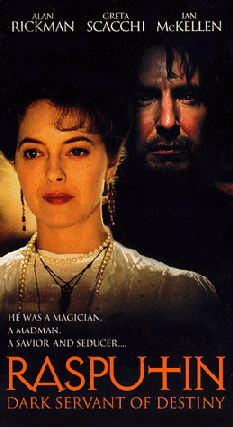
Rasputin: Dark Servant of Destiny is a 1996 biographical historical drama television film which chronicles the last four years (1912–16) of Grigori Rasputin's stint as a healer to Alexei Nikolaevich, Tsarevich of Russia; the heir apparent to the Russian throne as well as the only son of Tsar Nicholas II of Russia and Empress Alexandra Feodorovna; who suffered from hemophilia. The film is narrated in the first person by Alexei.
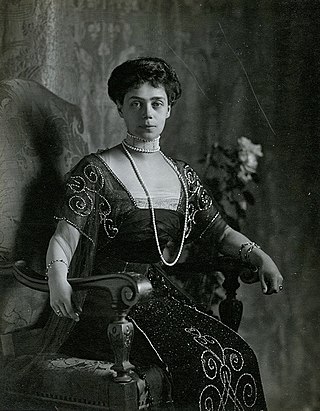
Grand Duchess Xenia Alexandrovna of Russia was the elder daughter and fourth child of Tsar Alexander III of Russia and Dagmar of Denmark. She was the sister of the last Emperor of Russia, Nicholas II.

Alexei Andreyevich Polivanov ; 16 March [O.S. 4 March] 1855 – 25 September 1920) was a Russian military figure, infantry general (1915). He served as Russia's Minister of War from June 1915 until the Tsarina Alexandra forced his removal from office in March 1916.
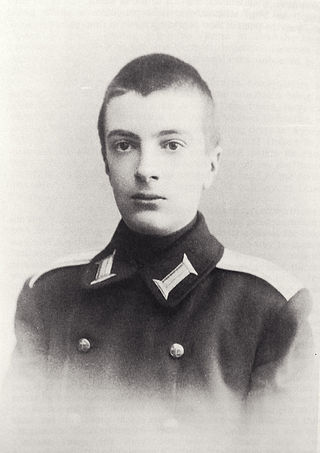
Grand Duke Alexei Mikhailovich of Russia was the sixth son and youngest child of Grand Duke Michael Nicolaievich of Russia and a first cousin of Alexander III of Russia. He was destined to follow a career in the Russian Navy, but he died in his youth of tuberculosis.

The Emperor's Candlesticks is a 1937 historical drama film starring William Powell and Luise Rainer and directed by George Fitzmaurice. It is based on the 1899 novel of the same name by Baroness Orczy. The story follows the adventures of spies from opposing sides who fall in love while following the eponymous candlesticks—and the papers hidden inside them—all over turn-of-the-20th-century Europe.
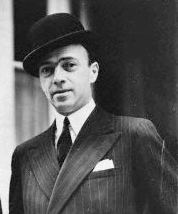
Prince Dmitri Alexandrovich of Russia was the fourth son and fifth child of Grand Duke Alexander Mikhailovich of Russia and Grand Duchess Xenia Alexandrovna of Russia. He was a nephew of Tsar Nicholas II of Russia.

The Romanovs: An Imperial Family is a 2000 Russian historical drama film about the last days of Tsar Nicholas II and his family. The Russian title implies both the Imperial Crown of Russia and the crown of thorns associated with martyrs. The film premiered at the 22nd annual Moscow Film Festival. The film was selected as the Russian entry for the Best Foreign Language Film at the 76th Academy Awards, but it didn't make the final shortlist.

Nicholas II or Nikolai II was the last reigning Emperor of Russia, King of Congress Poland, and Grand Duke of Finland from 1 November 1894 until his abdication on 15 March 1917. He married Alix of Hesse in 1894 and had children Olga (1895), Tatiana (1897), Maria (1899), Anastasia (1901) - collectively known as the OTMA sisters - and the tsarevich Alexei Nikolaevich.
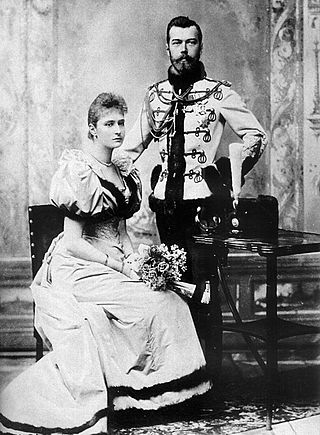
The wedding of Nicholas II of Russia to Alexandra Feodorovna occurred on 26 November [O.S. 14 November] 1894 at the Grand Church of the Winter Palace.

Grand Duchess Olga Nikolaevna of Russia was the eldest child of the last Russian emperor, Nicholas II, and of his wife Alexandra.




















